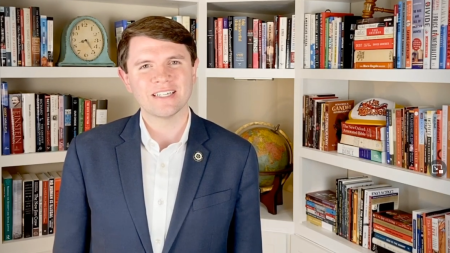Baptist lawmaker: Texas' plan for Bible-based school curriculum 'unconstitutional'

A Texas lawmaker and seminary student says he opposes a plan to infuse state teaching curriculum with Bible concepts because it violates the U.S. Constitution.
State Rep. James Talarico, D-Austin, says he equates a proposal to incorporate Bible references into the public school curriculum with Christian nationalism, which, in the congressman’s view, equates to “elevating our religion over others — dominating our neighbors instead of loving them as ourselves.”
Talarico gave his comments on the heels of a State Board of Education (SBOE) series of public hearings last week in Austin on the proposed curriculum which provides instructional guidelines for K-5 teachers that include historical references to the Bible.
Inspired by House Bill 1605, which established a revised process by which SBOE approves “high-quality instructional materials,” the draft curriculum has spurred controversy over the inclusion of references to the “Christian Bible,” the Gospel narrative of Jesus being born in a manger, and defining the word “Messiah” as a “savior sent by God.”
When asked whether he opposes the sharing of the Christian faith in the public square, Talarico told CP via email: “Christian activism is not Christian nationalism. Christian nationalism is elevating our religion over others — dominating our neighbors instead of loving them as ourselves.
“There is nothing Christian about Christian nationalism. It is the worship of power — social power, economic power, political power — in the name of Christ. And it is a betrayal of Jesus of Nazareth. And it’s incumbent upon all Christians to confront this heresy and denounce it.”
During a House Public Education Committee meeting in August that began with testimony from Texas Education Agency Commissioner Mike Morath, Talarico raised concerns about what he described as the “separation between church and state” and what he views as a bias toward Christianity in school curriculum materials.
One of those concerns, says Talarico, is what he sees as a distinction between “preaching” and “teaching.”
“I think kids should learn about the major world religions in school, including Christianity,” he told CP. “They need it to understand the world, understand literature, understand their own culture and other cultures. But when the state usurps the role of the church — preaching Christianity instead of teaching it — the government violates the constitutional separation of church and state found in our First Amendment.”
Talarico added that he believes the authors of HB 1605 themselves were concerned enough to insert a provision into law which, he says, “provides immunity to teachers for violating the Establishment Clause in our First Amendment while teaching this curriculum.”
The curriculum, which features Bible references, including a lesson titled “Christianity and the Roman Empire,” with a stated reading objective for students to “explain how Jesus of Nazareth’s life impacted the Roman Empire,” is part of a batch of documents released earlier this year ahead of November, when the Texas Education Agency (TEA) will adopt new Texas Open Resource Materials for the 2025-26 school year.
When CP asked whether the curriculum marks any significant deviation from previous school years, a spokesman for Morath said Texas Open Education Resources (OER) “differ from other commercially available offerings in that they are a knowledge coherence product,” with an emphasis on “building background knowledge and conceptual depth over time.”
“For example, kindergarten students learn about the five senses and understand the purpose and makeup of the eyes in an age-appropriate way,” the spokesman added. “In first grade, they learn that the eyes are organs in the body and begin to use more technical vocabulary related to body systems. The same methodology is incorporated throughout the product, including mentions of history and social sciences.”
But for Talarico and other opponents of the proposed curriculum, it all comes down to how the state defines religious terms, which he believes could lead to the exclusion of other faith traditions.
For example, said Talarico, the definition of “messiah” as “a savior predicted by ancient Hebrews and believed by Christians to be Jesus” was included in the original curriculum and is what he defines as “teaching.”
“I support its inclusion in our public school curriculum,” he said. “But the new curriculum simply defined ‘messiah’ as a ‘savior sent by God.’ That’s preaching.”
For the 35-year-old former teacher, who previously called the inclusion of the Ten Commandments in classrooms as “deeply un-Christian,” defining the word “messiah” as a Heaven-sent Savior is likewise “dangerous” and “un-Christian.”
“Christians understand that it's dangerous for the government to define our religious teachings for us and that it is un-Christian to exclude our neighbors with different religious beliefs,” he explained.
TEA has until Oct. 14 to complete any revisions to its new Bible-infused Bluebonnet Learning program before the board votes in November on a final list of approved materials.





















